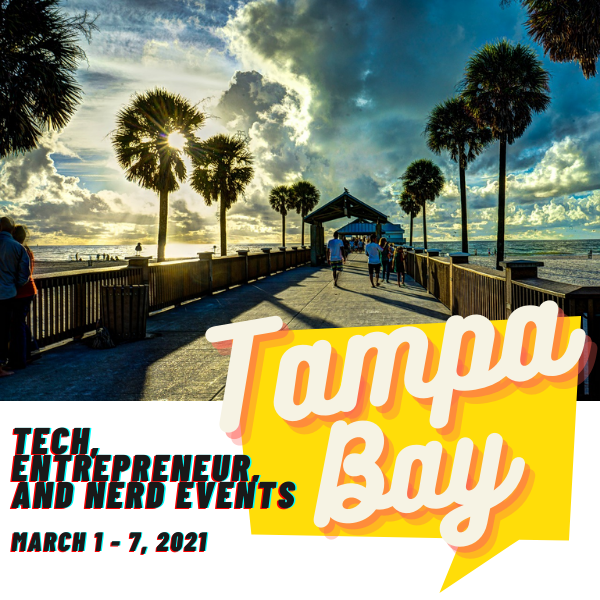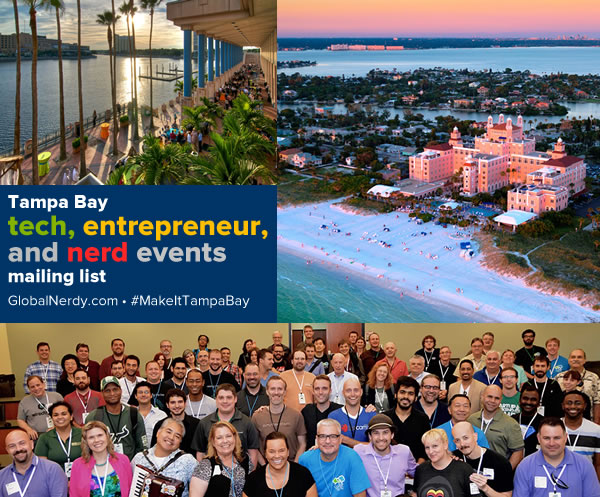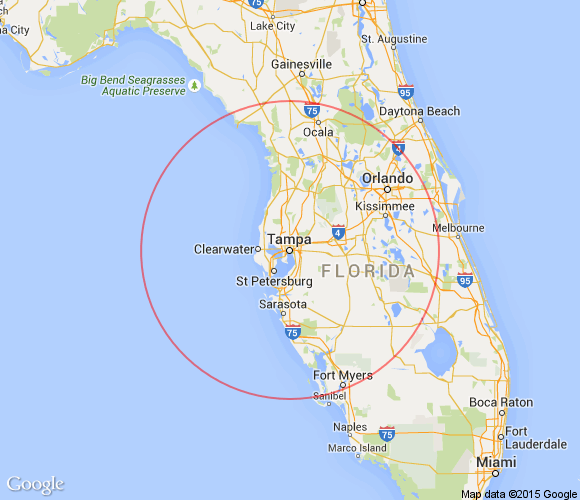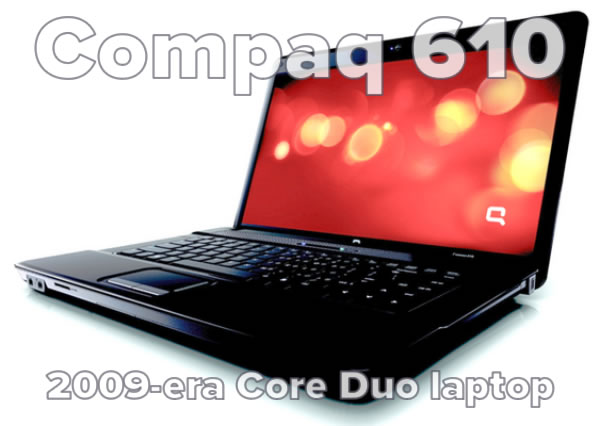
It’s the first week of a new month, and the final month of the first quarter! Here’s your list of tech, entrepreneur, and nerd events for Tampa Bay and surrounding areas for the week of Monday, March 1 through Sunday, March 7, 2020.
This is a weekly service from Tampa Bay’s tech blog, Global Nerdy! For the past four years, I’ve been compiling a list of tech, entrepreneur, and nerd events happening in Tampa Bat and surrounding areas. There’s a lot going on in our scene here in “The Other Bay Area, on the Other West Coast”!
By “Tampa Bay and surrounding areas”, this list covers events that originate or are aimed at the area within 100 miles of the Port of Tampa. At the very least, that includes the cities of Tampa, St. Petersburg, and Clearwater, but as far north as Ocala, as far south as Fort Myers, and includes Orlando and its surrounding cities.
For the time being, I’m restricting this list to online events. We’re still deep in a pandemic, and the way out is to stop the spread, however we can. In the age of broadband internet, smartphones, and social media, it’s not that hard. Stay home, stay safe, stay connected, and #MakeItTampaBay!
Monday, March 1
- Tampa Bay Tech Career Advice Forum — Job Seeker Coffee Talk @ 9:00 AM to 10:00 AM EST
- ReadingWorks! — ReadingWorks! Online Event @ 10:00 AM to 10:45 AM EST
- Christian Professionals Network Tampa Bay — Live Online Networking- Monday @ 11:30 AM to 1:00 PM EST
- Entrepreneurs Empower Empire — Office Hour @ 12:00 PM to 1:00 PM EST
- Toastmasters, Division D — ACE Advanced Toastmasters 3274480 @ 6:00 PM to 7:30 PM EST
- We Write Here Black and Women of Color Writing Group — Virtual Writing Get Downs @ 6:00 PM to 8:30 PM EST
- Toastmasters Division G — Triple Crown Toastmasters Club 4147 (Virtual) @ 6:30 PM to 7:30 PM EST
- Toastmasters Division E — Lakeland (FL) Toastmasters Club #2262 @ 7:00 PM to 8:30 PM EST
- Toastmasters District 48 — Beam Into Our Awe Inspiring Universe Monday’s for Intellectual Stimulation & Fun @ 7:00 PM to 8:15 PM EST
- Tampa Bay Investors & Traders — Stocktwits Meetups — Winning Wall Street’s Money with Stocks, Options, Futures, Forex, Crypto, etc @ 7:00 PM to 9:00 PM EST
- Programmers of Portables — Let’s make a game (part two, with Python and Pygame)! @ 7:00 PM to 9:00 PM EST
- Orlando Stoics — The Key Lessons from Marcus Aurelius @ 7:00 PM to 8:30 PM EST
- Nerdbrew Events — Anime Watch Party @ 7:00 PM to 10:00 PM EST
- Tampa Bay Agile — McCarthy TeamWork BootCamp – A Sampler @ 7:30 PM to 9:00 PM EST
- Thinkful Tampa | Careers in Tech — Thinkful Webinar | UX/UI Design: Designing A UX Case Study @ 8:00 PM to 10:00 PM EST
- Toastmasters District 84 — Toastmasters Bi-Monthly Forum: @ 8:00 PM to 9:00 PM EST
- Sunshine State Startup: Idea to IPO — FREE! Pitch to Angel Investor Gary Jinks, Managing Director, South Valley Angels @ 10:00 PM to 11:30 PM EST
Tuesday, March 2
- Tampa Bay Agile — v-Lean Coffee @ 7:30 AM to 8:30 AM EST
- Young Professionals of Tampa Bay Networking Group — Carrolwood Networking Breakfast @ 7:30 AM to 9:00 AM EST
- Professional Business Networking with RGAnetwork.net — Downtown St Pete Networking Virtually JOIN us @ 7:30 AM to 9:00 AM EST
- Suncoast Credit Union Micro Enterprise Development Meetup — SBA PPP Palooza @ 9:00 AM to 10:00 AM EST
- Tampa Bay Tech Career Advice Forum — Writing Resumes that Work! @ 10:00 AM to 11:30 AM EST
- Toastmasters District 48 — Westshore Toastmasters @ 12:00 PM to 1:00 PM EST
- Orlando Cybersecurity Meetup — Panel Discussion | Looking back and moving forward: Your IT security strategy @ 2:00 PM to 4:00 PM EST
- Free Video Production Classes – TV/Internet — Social Video Marketing Tips(ONLINE CLASS)-FREE for Hillsborough County Residents @ 4:15 PM to 5:15 PM EST
- Headquarters Coworking – Kissimmee — Founders Night – Building Your Team Out and Up @ 5:00 PM to 7:00 PM EST
- Tampa Hackerspace — Online Weekly Open Make Night @ 6:00 PM to 10:00 PM EST
- Suncoast Developers Guild — WordPress St Pete Meetup at SDG @ 6:30 PM to 8:30 PM EST
- Code For Orlando — Community Action Night @ 6:30 PM to 9:00 PM EST
- Central Florida Philosophy Meetup — Thomas Paine’s COMMON SENSE @ 7:00 PM to 7:50 PM EST
- Tampa Hackerspace — THS Member Meeting Online @ 7:00 PM to 8:00 PM EST
- Tampa Bay Investors & Traders — Stocktwits Meetups — Winning Wall Street’s Money with Stocks, Options, Futures, Forex, Crypto, etc @ 7:00 PM to 9:00 PM EST
- Brandon Boardgamers — Board Gaming – ONLINE ONLY @ 7:00 PM to 9:00 PM EST
- MakerFX Makerspace — Intro to 3D Printing at MakerFX @ 7:00 PM to 9:00 PM EST
- Orlando Adventurer’s Guild — Icewind Dale: Rime of the Frostmaiden – (Tier 1, APL 1) – DM Canon @ 7:00 PM to 11:00 PM EST
- Shut Up & Write!® Tampa — Online Event: Shut Up & Write on Zoom @ 7:45 PM to 9:15 PM EST
Wednesday, March 3
- 1 Million Cups Orlando — GIVVN / MemberHub, Inc @ 9:00 AM EST
- 1 Million Cups St. Pete — Mark masters Comedy @ 9:00 AM EST
- 1 Million Cups Tampa @ 9:00 AM EST
- North Tampa Networking Group — Business networking @ 9:00 AM to 10:00 AM EST
- Wesley Chapel, Trinity, New Tampa Business Professionals — Lutz, Wesley Chapel, New Tampa Virtual Networking Lunch @ 11:30 AM to 1:00 PM EST
- Success Strategies for Business Owners — Starting A Business in FL @ 12:00 PM to 1:00 PM EST
- Tampa Bay Agile — Heart of Agile Weekly Coffee Corner @ 12:30 PM to 1:45 PM EST
- Free Video Production Classes – TV/Internet — Digital Video Editing Class (ONLINE CLASS) -FREE for Hillsborough residents only @ 1:00 PM to 3:00 PM EST
- Christian Professionals Network Tampa Bay — Live online Networking 1st Wednesday @ 1:30 PM to 3:00 PM EST
- Sunshine State Startup: Idea to IPO — Silicon Valley Career Fair (Online) @ 4:00 PM to 10:00 PM EST
- Tampa Bay Agile — Scrum Master Guild – Setting a Team Vision and Keeping it Alive @ 6:00 PM to 8:00 PM EST
- Tampa Bay Business Intelligence and Data Analytics — Monthly Meeting @ 6:00 PM to 8:00 PM EST
- Orlando Adventurer’s Guild — Tales from the Yawning Portal (APL12 – T2 OK, but you may die) @ 6:30 PM to 9:30 PM EST
- Toastmasters District 48 — Carrollwood Toastmasters Meetings now conducted Online using Zoom @ 7:00 PM to 8:30 PM EST
- MakerFX Makerspace — Orlando 3D Printing Meetup @ 7:00 PM to 9:00 PM EST
- Central Florida AD&D (1st ed.) Grognards Guild — New Beginnings & Old Rivalries @ 7:00 PM to 10:30 PM EST
- Orlando Lady Developers Meetup — Lady Devs Social – kick off to hackathon weekend! @ 7:00 PM to 8:00 PM EST
- Orlando 3D Printing Meetup — 1st Wednesdays: 3D Printing Latest Developments + Show & Tell ! @ 7:00 PM to 9:00 PM EST
- Nerdbrew Events — Sarah’s Arts Crafts and Bad TV Hangout Night @ 8:00 PM to 12:00 midnight EST
Thursday, March 4
- Professional Business Networking with RGAnetwork.net — Lutz/ Wesley Chapel Early Bird Networking Meeting at the Happy Hangar @ 7:03 AM to 8:33 AM EST
- BNI Dealmakers – South Tampa — BNI Dealmakers of South Tampa @ 7:15 AM to 9:00 AM EST
- Uptown Biz Pros — Build your business with Biz Pros @ 8:30 AM to 10:00 AM EST
- St Petersburg Business Builders Meetup — St Pete Business Builder Meetup @ 10:00 AM to 11:30 AM EST
- ProductTank Central Florida — Product Tank #18 – A WORKSHOP for remote product management @ 12:00 PM to 1:00 PM EST
- Tampa Startup Founder 101 — Networking for a Remote Startup Co-Founder, with CoFounders Lab @ 12:00 PM to 2:00 PM EST
- Avocado Labs – Online Talks — 8 healthy recipes using Angular and RxJS @ 6:00 PM to 7:00 PM GMT+1
- Tampa Bay Tech Career Advice Forum — The Job Seekers Lunch Hour @ 12:00 PM to 1:00 PM EST
- Tampa Bay Investors & Traders — Stocktwits Meetups — Winning Wall Street’s Money with Stocks, Options, Futures, Forex, Crypto, etc @ 1:00 PM to 3:00 PM EST
- Free Video Production Classes – TV/Internet — YouTube Basics (ONLINE CLASS) – FREE for Hillsborough County Residents @ 3:00 PM to 4:00 PM EST
- Sarasota Ladies Reading — March meetup @ 6:00 PM to 8:00 PM EST
- Orlando Adventurer’s Guild — DDAL-EB-03 Where the Dead Wait (session 2) – An Eberron Oracle of War adventure @ 6:30 PM to 10:00 PM EST
- Toastmasters District 48 — GREY MATTERS: The Forum For Open Minds @ 6:30 PM to 8:30 PM EST
- Swift in Sarasota — Online Swift in Sarasota Special Meetup: Property Wrappers @ 6:30 PM to 7:10 PM EST
- Drupal User Group of Tampa Bay — Drupal Live Forum / Q&A @ 7:00 PM to 8:30 PM EST
- Tampa Hackerspace — Online Electronics Guild Meetup @ 7:00 PM to 9:00 PM EST
- Brandon Boardgamers — Board Gaming – ONLINE ONLY @ 7:00 PM to 9:00 PM EST
- Science Fiction/Fantasy Virtual Orlando Meetup for Writers — Science Fiction/Fantasy Virtual Orlando Meetup for Writers @ 7:30 PM to 9:30 PM EST
- Virtual Orlando Crypto-Growing for Newbies Club — How To Earn 60X Your Cyrpto Holdings Within The Next 12 Months WITHOUT RISK! @ 8:30 PM to 10:30 PM EST
Friday, March 5
- Dr. Phillips Chamber of Commerce — Friday Weekly Leads Group of Dr. Phillips @ 8:30 AM to 9:30 AM EST
- Tampa Bay Tech Career Advice Forum — Effective Salary Negotiations with Chris Rosbaugh @ 10:00 AM to 11:30 AM EST
- West Orlando WordPress Meetup — WordPress Collaboration Meetup ONLINE ONLY @ 10:00 AM to 11:30 AM EST
- USWVDUG — USWVDUG: March Meetup @ 12:00 PM to 2:00 PM EST
- Oviedo Middle Aged Gamers (OMAG) — Tabletop: Friday Board Game Night @ 7:00 PM to 11:59 PM EST
- Orlando Stoics — ONLINE: Handbook for New Stoics (Exercise 25) @ 7:00 PM to 8:30 PM EST
- Elevated for Success Women’s Networking Group — Connect and Chat – Roundtable Mastermind @ 9:00 AM to 11:00 AM EST
Saturday, March 6
- Central Florida AD&D (1st ed.) Grognards Guild — Kalpoc’s Daredevils @ 6:00 AM to 10:00 AM EST
- Social Entrepreneurs Business Startup Network — Early Bird Catches the Worm Event @ 9:00 AM to 10:00 AM EST
- Toastmasters Division E — Hunters Creek Toastmasters @ 9:30 AM to 11:00 AM EST
- Orlando Lady Developers Meetup — New member meet & greet! (monthly) @ 12:00 PM to 2:00 PM EST
- Creative Writing in our Chaotic World — Let’s Start Writing! @ 12:00 PM to 2:00 PM EST
- Florida Gulf Coast Chapter of Sisters in Crime — Let’s Make a Mystery: A Improv Murder Mystery @ 1:00 PM to 2:00 PM EST
- Windermere Personal Finance Meetup Group — Retirement Accounts @ 1:00 PM to 2:00 PM EST
- World Of Darkness RPG Meetup — The Secrets of Orlando (a The Secrets of Cats adventure) @ 7:00 PM to 10:00 PM EST
Sunday, March 7
- Social Entrepreneurs Business Startup Network — Early Bird Catches the Worm Event @ 9:00 AM to 10:00 AM EST
- Shut Up & Write!® St. Petersburg — Shut Up & Write – March 7th, 2021 @ 9:00 AM to 10:00 AM EST
- Tampa Bay Coalition of Reason — xpost: Compassion Action: Humanists are Changing the Landscape of Grassroots Aid @ 3:00 PM to 4:00 PM EST
- Orlando Stoics — ONLINE: Presentation at Stoic Salon: PUBLIUS RUTILIUS RUFUS THE LAST HONEST MAN @ 3:00 PM to 4:00 PM EST
- Women’s 20s-30s Book Club — The Vanishing Half Book Discussion @ 3:00 PM to 5:00 PM EST
Do you have any events or announcements that you’d like to see on this list?
Let me know at joey@joeydevilla.com!
Join the mailing list!
If you’d like to get this list in your email inbox every week, enter your email address below. You’ll only be emailed once a week, and the email will contain this list, plus links to any interesting news, upcoming events, and tech articles.
Join the Tampa Bay Tech Events list and always be informed of what’s coming up in Tampa Bay!











